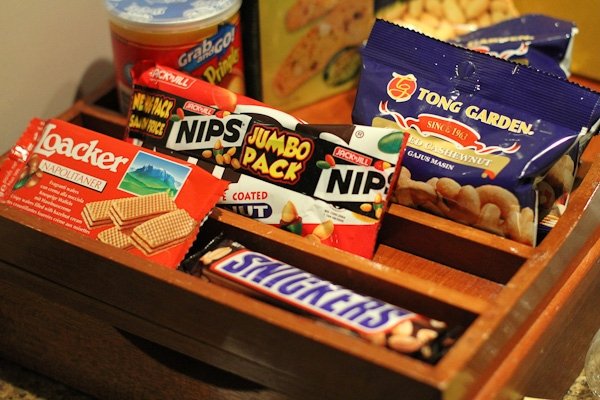Eat well, study smart

Sometimes food. All food is good, but some foods should be eaten more often than others. Photo: Aun Ngo
YOU are what you eat, but good eating habits doesn’t mean you have to throw out the chocolate, chips and ice-cream altogether the next time you shop.
Instead of categorising food as being either good or bad, a healthier way of thinking about what and how we eat is discerning between the “everyday” and “sometimes” foods, says dietitian Winnie Kam.
Everyday foods are what we are encouraged to eat a lot of; while foods we generally regard as unhealthy or junk are what dietitians call sometimes food.
Eat well, study smart
Your body needs enough energy, protein, fat, vitamins and minerals to function at its best – and the problem with replacing everyday foods with sometimes foods is that the latter may provide the body with the same calories for energy, but not the adequate nutrition it needs.
Desserts and sweets for example, are packed with refined sugars, and the spike of energy, or “sugar rush” you experience soon after downing a cookie dissipates just as quickly as it hits you, and before long you are left feeling hungry again.
What your body needs is a constant supply of energy, says Ms Kam, so resist the temptation to save time by chowing down on whatever is at hand. Have a proper meal instead, and your body will thank you both in the short term – in areas such as concentration and mental well being – and the future.
Alternatives to the quick energy fix are fruits, grains, legumes and whole-grain breads, which are good options to sustain the energy supply as they contain unrefined carbohydrates. They also contain fibre which keeps you full, as well as maintain bowel function.
What we eat also has a long-term cumulative effect on our bodies, which means we may not experience the consequences till much later on in life, says Ms Kam. Foods such as doughnuts, potato crisps and chips contain high amounts of saturated fats, and excessive consumption in the long term has been shown to be linked to type 2 diabetes, coronary heart diseases, hypertension and obesity.
Meal ideas
Once an international student herself, Ms Kam understands the stresses students face with exams and looming deadlines for assignments. But instead of succumbing to fast food and takeout, she offers some handy tips for a well-balanced meal.
Breakfast
Breakfast is the most important meal, and there should be no reason to miss breakfast, says Ms Kam.Most breakfast foods have a long shelf life and can be stocked up in the pantry.
A bowl of cereal, eggs on toast, or a packet of oats are quick and cheap options. If you have an extra five minutes, try baked beans on toast, topped with a slice of melted cheese.
Lunch
Lunch can be quite a challenge if you’re out of home, but if microwave facilities are available, you may want to think about cooking extra for dinner and packing the leftovers for lunch, says Ms Kam. Otherwise, freshly made sandwiches loaded with greens are a good alternative.
And if you have to buy, avoid fast food. Melbourne has many cafes with freshly-prepared meals.
Snacks
Snacks can go a long way in topping up your energy levels and providing extra nutrition between meals. Swap that packet of potato chips with a handful of unsalted mixed nuts, lightly salted or plain popcorn, muesli bars or some cheese and biscuits.
For those with a sweet tooth, a slice of fruit toast with low-fat spread, yoghurt, custard, fruits, or even a glass of milk helps fill you up without compromising on nutrition.
Dark chocolate is also high in anti-oxidants, so go ahead and treat yourself to a small square. Just remember, moderation is key.
Dinner
Looking for something quick and healthy to cook for dinner? Ms Kam suggests www.taste.com.au as a good resource for meal ideas. Some recipes contain a nutritional breakdown of the meal, which can be very helpful and informative.
Easy meals to whip up at home include a lean piece of steak with salad, spaghetti bolognese, roast chicken, fried rice with mixed brightly coloured vegetables, and chicken stir-fry with cashew and capsicum.
Other handy tips and advice
- Planning and cooking your own meals can be therapeutic, and offers a break from stress, so it’s good to set aside one afternoon to plan, buy groceries, and prepare foods so that they are ready in the fridge or freezer – this saves the hassle of multiple trips to the supermarket.
- Where possible, choose reduced salt and low fat options.
- Before an exam, choosing protein over carbohydrate foods can help to keep your mind more alert.
- Snack smart but if you want some potato crisps, never eat straight from the packet. Pour out a small amount into a bowl and enjoy it. This helps with mindless overeating.
